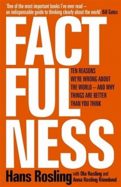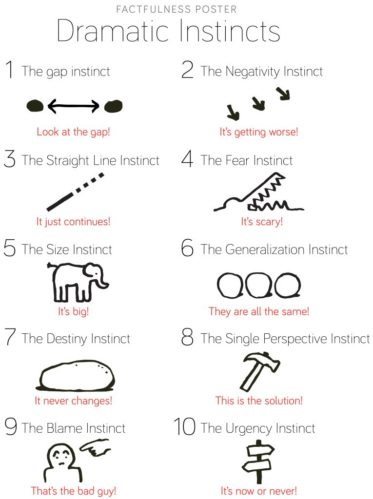Factfulness – Ten Reasons We Are Wrong About The World; And Why Things Are Better Than You Think
Author: Hans Rosling
Genre: Economics, Healthcare

Bill Gates, my personal hero, calls it “One of the most important books I’ve ever read – an indispensable guide to thinking clearly about the world”. That should be reason enough to take a look. By the time you are done, Rosling fills you with immense positivity about the world situation and passion to make a difference.
Rosling, who died of cancer last year, was an adviser to UNICEF and WHO and started Medicines Sans Frontieres in Sweden. His TED talks have been viewed more than 35 million time and Time magazine called him one of the hundred most influential people in the world. In this book, he tries to coach us on “Factfulness: the stress reducing habit of only carrying opinions for which you have strong supporting facts.”
Let’s take a Quiz (the book starts with a longer version of this):
1. In all low-income countries across the world today, what percent of girls finish primary school?
- 20%
- 40%
- 60%
2. In the last 20 years, the proportion of the world population living in extreme poverty has…
A. almost doubled
B. remained more or less the same
C. almost halved
3. The UN predicts that by 2100 the world population would have increased by another 4 billion people. What is the main reason?
A. More children
B. More adults
C. More old people
If we continue to be pessimistic and harbor old notions of poor countries and aging population, this book goes all out to change it. The correct answers are 1.C (most girls finish school even in poor countries); 2.C. (extreme poverty has declined rapidly); and 3.B. (most population increase will be in adults).
Similar reassuring data comes from all sides: Legal slavery has reduced from 193 countries to only 3 in the last 200 years; Every single nation has improved on child mortality; Oil spills have significantly reduced (500+ incidents 30 years ago to ‘only’ 6 now); Child labor has reduced from 28% of kids to 10% in the last 50 years; Nuclear arms have reduced from 64000 to 15000 in the last 30 years, and so on.
And as a corollary, good things are increasing: Women’s Right to Equal Vote moved from 1 country to 193 country in the last 100 years (out of total 194 countries); Share of children across the globe who got at least 1 vaccination moved from 22% to 88% in the last 50 years; Share of humanity living in democracy moved from 1% to 56% in the last 200 years; Share of Adults with basic skills to read and write moved from 10% to 86% in last 200 years… and so on.

Unfortunately, our media wants ‘news’ that can rattle us, and hence the emphasis on all that is wrong. The author says:
“No wonder we get an illusion of constant deterioration… Gradual improvement is not news. Beware of rosy pasts. People often glorify their early experiences and nations glorify their histories.” And yet in countries as far apart as Sweden and India, Rosling shows data to prove that the current generation is significantly better off than, say, 50 years ago. Even in a relatively poor country like Bangladesh, in 1972, Bangladeshi women had on average 7 children and life expectancy was 52 years. Today it is 2 children per woman and 73 years. “In four decades, Bangladesh has gone from miserable to decent… In Egypt, in 1960, 30% of all children in the land around the Nile died before their fifth birthday. The Nile delta was a misery for children, with all sorts of dangerous diseases and malnutrition… Today, Egypt’s child mortality rate (is) at 2.3%.”
The various data points are also a shot for capitalism: Economic levels seem to be the single biggest indicator of health and well-being. The inside cover of the book maps all countries across lifespan and income levels. And you can see an absolutely linear chart: almost all poor countries have low life expectancy and almost all rich countries have high life expectancy. Same for other metrics like babies per woman or healthy children, which tend to improve with wealth.

And it is not just economic data. “A wise prime minister looks at the numbers, but not only at the numbers… The end goal of economic growth is individual freedom and culture.” Think about information sharing and absolute power that dictators enjoyed historically. 15 million people died in China in 1960 and it was kept a secret. Can we imagine that happening today?
The dilemma of who to blame for what is still in a mess makes up for a very interesting reading. In a class, Rosling tells his students that big pharma hardly does any research on malaria and sleeping sickness and other maladies that affect only the poorest. A student indignantly replies, “Let’s punch them in the face.” The question is who do we punch? R&D department? But they work under the CEO. And most large pharmas are public companies where CEOs actually work under the board. But then the board is fiduciary responsible to maximize shareholder returns, so we should reach out to the ultimate shareholders. It turns out that stocks of stable stocks like big pharma are largely owned by retirement funds, which are investing the money of the very old! So Rosling says cheekily, “If you feel you need someone to blame and punish, it’s the seniors and their greedy need for stable stocks!” His message is to “look for causes, not villains”, because “bad things can happen without anyone intending them to.”
The overall book cautions us against 10 such instincts where we jump to conclusions based on our biases, instead of doing a careful analysis of facts.

To be clear, Rosling would be the first to admit that there are real problems in this world too: global warming, terrorism, threat of world war III etc. But negativity, fear, blame etc. make us not see things in perspective. And stop us from focusing on actually bringing about a change. Rosling actually starts his sessions with the ancient art of sword swallowing, which he learnt to show the limits of what is possible if we use a data based approach (turns out that when we put our chin forward, it creates a hollow in our neck where, with practice, a sword can be made to go inside)!
Why should you read the book: To learn the art and science of a fact based dialogue. Moving away from opinions and biases to data based and rationale argument. To be inspired that this world, even with all its flaws, is actually in much better shape than it ever was.
Goodreads Link: Factfulness: Ten Reasons We’re Wrong About the World – and Why Things Are Better Than You Think by Hans Rosling | Goodreads

 This information will never be shared with third party
This information will never be shared with third party
Really helpful, Thanks a lot for sharing!
Great